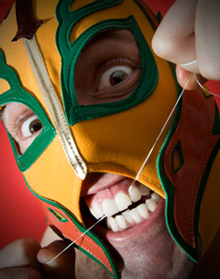How I Stopped Making Excuses
November 8, 2011 — By Dr. Pete Some people get thunderbolts from the sky. My epiphanies always seem to happen in the bathroom. I'm sure Freud would have something to say about it, but let's not get into that. Who's the psychologist here, anyway? Yeah, I thought so.
Some people get thunderbolts from the sky. My epiphanies always seem to happen in the bathroom. I'm sure Freud would have something to say about it, but let's not get into that. Who's the psychologist here, anyway? Yeah, I thought so.
So, anyway: bathrooms. I've had a long-standing "goal" to floss more. I put it in quotes because I've never actually bothered to put any effort into it. Like most Americans, I guilt-floss 15 times the day before my dentist appointments, once a day for the week after, and then declare mission accomplished for the rest of the year.
Then, something changed.
The hardest part of writing this blog is that something about my motivation is changing, but I can't always describe it, let alone tell you when or how it happens. This time, though, I caught myself in the act. I was brushing my teeth, I saw the floss on the counter, and I thought: "If I can brush my teeth every night for almost 40 years, why can't I take 30 seconds to floss?"
That was it. I didn't have a good reason, and suddenly all of my excuses seemed ridiculous – and more than a little childish. So, I picked up the floss and I've flossed every night for the past 2 months. It's not even on my to-do list anymore – it's just automatic.
Ok, so you flossed.
I know – it's not exactly Tony Robbins material. Here's the thing about flossing, though: it falls into that giant set of goals that are theoretically unfailable, and yet we constantly fail at. It's not a matter of luck or who I know or how much money I have – I have total control over whether or not I floss (and I always have had that control). The same goes for many life changes – you can't completely control whether you get rich or famous or fall in love, but you can control what you eat, if you exercise, and whether or not you stop doing the things you know are slowly killing you.
So, why do we keep failing?
Part of the problem is that we don't really commit. When I only flossed because the dentist yelled at me, I was doomed to fail. When I believed it was important and good for my health, I had a chance. Either change for yourself or stop pretending – I can't help you there.
I can help you with the other part of the problem. In my mind, I made the task impossible. Sure, rationally, I know it's just flossing, but I hate the pre-bed ritual. My wife and I are lucky to get the baby to bed and eat before 10pm, and now I've got to brush my teeth, take out my contacts, and floss? Can't a guy just get some sleep?
Somehow, flossing expanded to become impossible. I didn't look at it as one 30-second task – I looked at it as an added brick on an already impossible load, and I'd have to carry that load countless times for the rest of my natural life. Even admitting that is kind of exhausting.
As soon as I realized that I already brushed every night and didn't think anything of it, and flossing would only take 30 more seconds, everything changed. In a couple of weeks, it was a habit, and now I barely even think about it. I certainly don't dread it.
Defuse your excuses.
The problem with excuses is that they always have a grain of truth. I really am a tired dad who sometimes just wants to go to bed. There's a difference between realizing I have limited time and energy, though, and feeling sorry for myself. Seeing the reality of the situation forced me to make a choice: were the benefits of flossing worth 30 seconds/day of my time? Once I asked the question that way, it was easy to say "yes".
So, cut the self-pity, stop projecting 20 years into the future, stop comparing yourself to anyone else, and ask a simple question: What would achieving your goal really take? Map it all out – time, money, skills you need to learn, equipment you need to buy, etc. Then ask if all of that's necessary and strip it back to the bare essentials. What would it take to get started?
Better yet, start and find out for yourself. The best way to unravel an excuse is to just start pulling.
Home | Who is Dr. Pete? | Are You A Real Doctor? | Can I Hire You? | Archive
©2026 User Effect, LLC.
